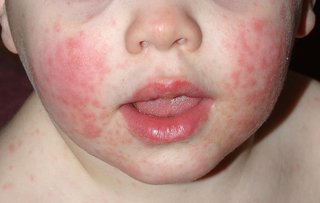Slapped cheek syndrome is common in children and should clear up on its own within 3 weeks. It's rarer in adults but can be more serious.
Symptoms of slapped cheek syndrome
The first sign of slapped cheek syndrome is usually feeling unwell for a few days.
Symptoms may include:
- a high temperature of 38 degrees Celsius or more
- runny nose
- sore throat
- headache
After 1 to 3 days, a bright red rash appears on both cheeks. Adults do not always get the rash.
After 1 to 3 days with a cheek rash, a light-pink rash may appear on the body. The skin is raised and can be itchy.

Causes of slapped cheek syndrome
It's hard to avoid spreading slapped cheek syndrome. Most people do not know they have it until they get the rash. You can only spread it to other people before the rash appears.
Slapped cheek syndrome is caused by a virus called parvovirus B19. The virus spreads to other people, surfaces or objects by coughing or sneezing near them.
To reduce the risk of spreading the virus you should wash your hands often with warm water and soap. Use tissues to trap germs when you cough or sneeze and bin used tissues as quickly as possible.
You do not have to stay off work or school after the rash appears. Let the school or teacher know if your child has slapped cheek syndrome.
How long it lasts
The cheek rash usually fades within 2 weeks.
The body rash also fades within 2 weeks but sometimes comes and goes for up to a month.
The rash can return when you're:
- exercising
- hot
- anxious
- stressed
Adults might also have joint pain and stiffness. This can continue for many weeks, even after the other symptoms have gone.
Treatment for slapped cheek syndrome
You do not usually need to see a GP for slapped cheek syndrome.
To ease symptoms while it clears up, you should:
- rest
- drink plenty of fluids to avoid dehydration – babies should continue their normal feeds
- take paracetamol or ibuprofen for a high temperature, headaches or joint pain
- use moisturiser on itchy skin
- talk to a pharmacist about itchy skin – they can recommend an antihistamine
Important
Do not give aspirin to children under 16
Non-urgent advice: Tell your midwife or GP if:
- you are pregnant
- you have a weakened immune system and have been near someone with slapped cheek syndrome
Non-urgent advice: See your GP if:
- you're pregnant – there's a very small risk of miscarriage or other complications
- have a blood disorder such as sickle cell anaemia or thalassaemia - there's a risk of severe anaemia
- you have a weakened immune system – for example, because of chemotherapy or diabetes
Urgent advice: Ask for an urgent GP appointment if you have:
- very pale skin
- shortness of breath
- extreme tiredness
- fainting
These can be signs of severe anaemia – you may need a blood transfusion.
